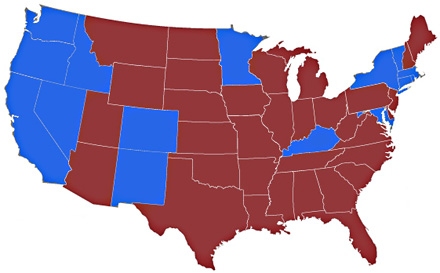Speaking of King v. Burwell, here’s the thing about it that I’ve always really wondered about. Suppose the plaintiffs win and Republicans can’t agree on a plan to do anything about it. Subsidies get eliminated in 34 states, almost all of them red. This basically guts Obamacare for anyone in, say, the bottom third of the income spectrum, which is virtually all Obamacare users. A few middle-class users with pre-existing conditions will still take advantage of it, which will  cause either a big death spiral or a little one among insurance companies, but rates will surely go up. Bottom line: the extent of the chaos is a little hard to predict, but for all practical purposes Obamacare goes away in red states.
cause either a big death spiral or a little one among insurance companies, but rates will surely go up. Bottom line: the extent of the chaos is a little hard to predict, but for all practical purposes Obamacare goes away in red states.
But in blue states? It’s business as usual. California will continue to hoover up federal subsidies and its exchange will be open for business as usual. Ditto for the liberal hellholes of New York and Taxachusetts and so forth.
Bottom line: We will have a thriving social welfare program for health care in the blue states—funded by everyone’s tax dollars—and nothing in the red states. Is that tolerable? Is it sustainable? Red states won’t be able to do much about it, aside from caving in and tacitly supporting Obamacare by starting up their own exchanges. So what happens? Does this eventually cause congressional Republicans to cave in completely and pass the infamous four-word fix? Do they hold out because they hate Obamacare just that much? Or what?
We’ve never had a major social spending program limited solely to the blue states who support it. It’s terra incognita. So what would happen?
NOTE: I continue to think the Supreme Court will do the right thing and rule against the plaintiffs in King. That would make this all moot. But you never know.

















